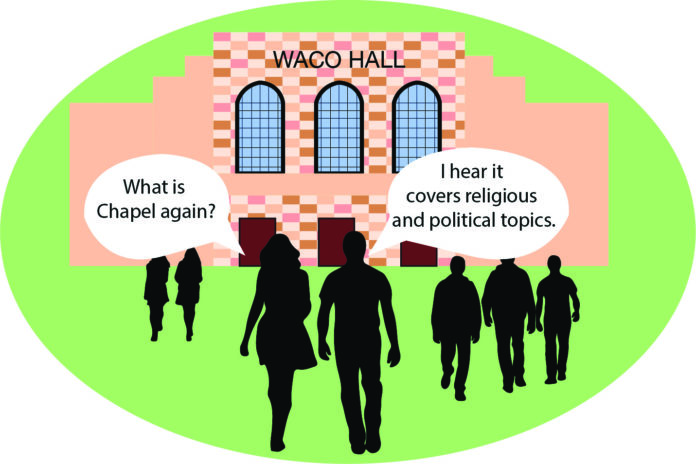Controversy ensued in response to Feb. 12 Chapel speaker Kaitlin Curtice, an author and citizen of the Potawatomi Nation, as some students felt that she was pushing a liberal agenda, while other students believed she was only expressing her Christian views in a different way than most Baylor students would be used to.
Conflict carried onto Twitter with a variety of complaints from students and even parents, one of whom even called The Lariat personally and asked if divisive speakers like this are the norm at Baylor.The reactions to Curtice revealed discrepancies in what the Baylor community believes is appropriate for Chapel.
Chapel has been a longstanding Baylor tradition for years— since 1845, Baylor has brought students together to listen to religious leaders, theologians, worship leaders and other individuals who give a faith-based presentation.
It’s a time for students to fully engage in the presentation in front of them, and talking with neighbors or being on your phone is prohibited. Chapel is also a university requirement—in order to graduate, Baylor students must attend and receive credit for two semesters of Chapel.
Regarding Curtice, Baylor put out a statement referencing that “on occasion, a speaker may veer away from our understanding of the message they planned to convey,” yet Curtice said Chapel leaders knew exactly what she was speaking about.
No matter how one may view the situation, the true issue lies not in whether you agree or disagree with Curtice, but rather in what the purpose of Chapel is actually supposed to be.
The Chapel website says that the service is a time for students “to come together to focus on both the God who made them and the universe in which they live” and that speakers are “people who excel at what they do as an expression of their commitment to Christ” and are meant to “enhance the lives of the Baylor Community.”
An issue with statements like these are that they muddle the real purpose of Chapel by including an overly broad definition. Right now, Chapel is at a standstill, with students questioning whether the service’s purpose is to further instill and educate on the Baptist mission, or to inform students of a variety of faith-related viewpoints, even ones that may be different from typical Baptist ways of worship.
Considering these two different possible definitions, controversy in Chapel is often a result of questioning what the tradition’s real purpose is. If Chapel is meant to steer students solely toward learning more about Baptist doctrine, then students could see Curtice’s presentation as overly political and incorrect Baptist worship. If Chapel is meant to be open and informative, however, Curtice’s speech can be seen as a different viewpoint and an interesting topic of conversation.
When students are unsure which way to view Chapel, a speaker can quickly become controversial when anything they say remotely coincides with Baptist viewpoints.
Whether Chapel is meant to be strictly Baptist or an opportunity to learn about different Christian ways of thought determines student reaction.
Either way, Chapel needs a clearer definition—although it is a longstanding tradition and Baylor is a Baptist university, the service has likely progressed in some ways since 1845 and the definition should continually be adjusted to include this.
Chapel is a worthwhile way for students to learn, but how and what students should be learning needs to be more clearly defined to avoid more conflict bred from ambiguity.






